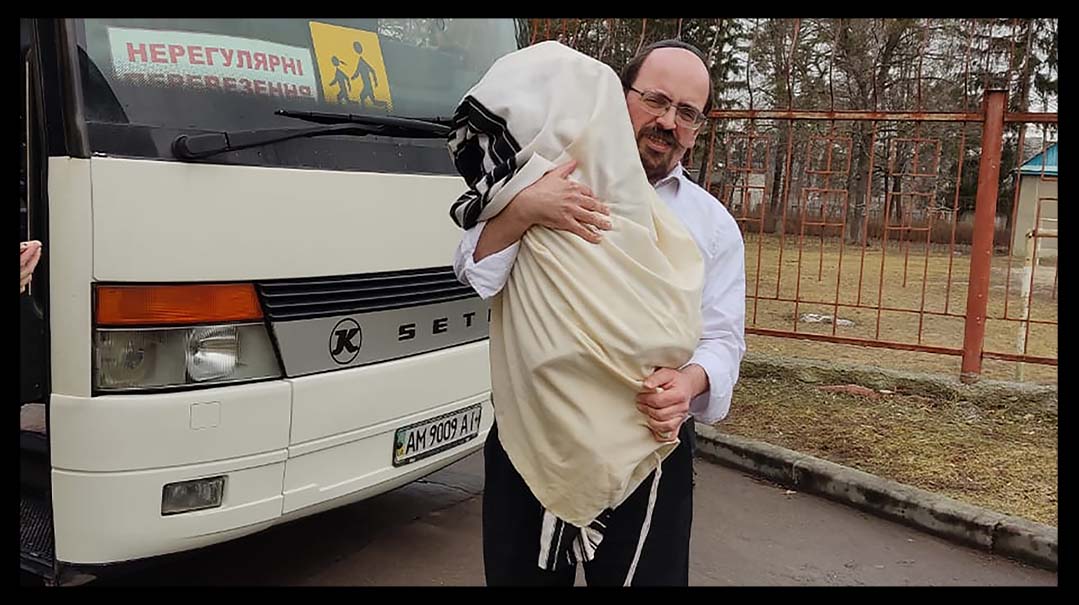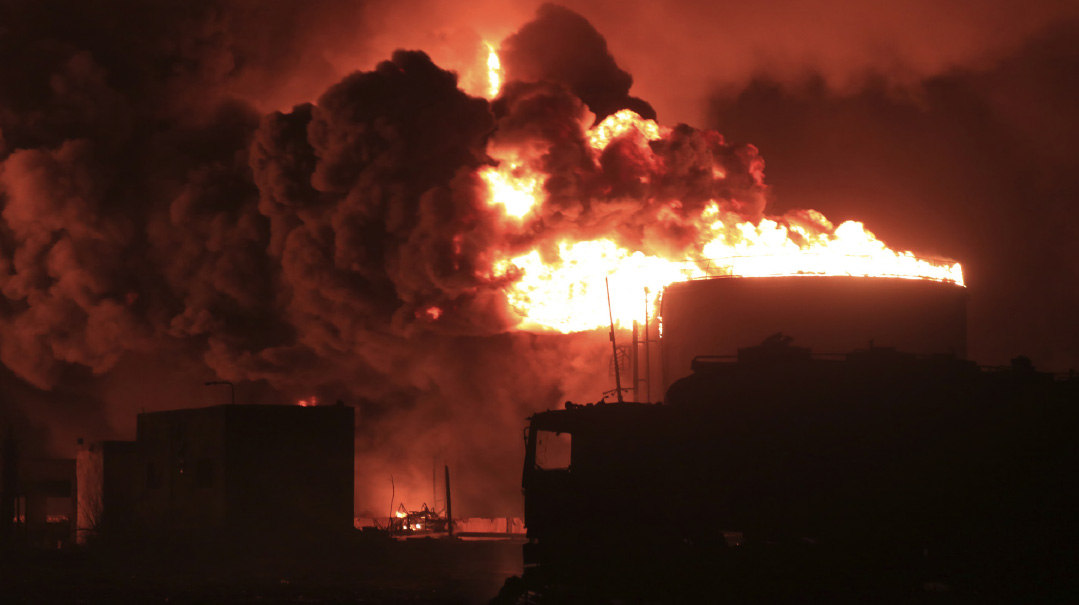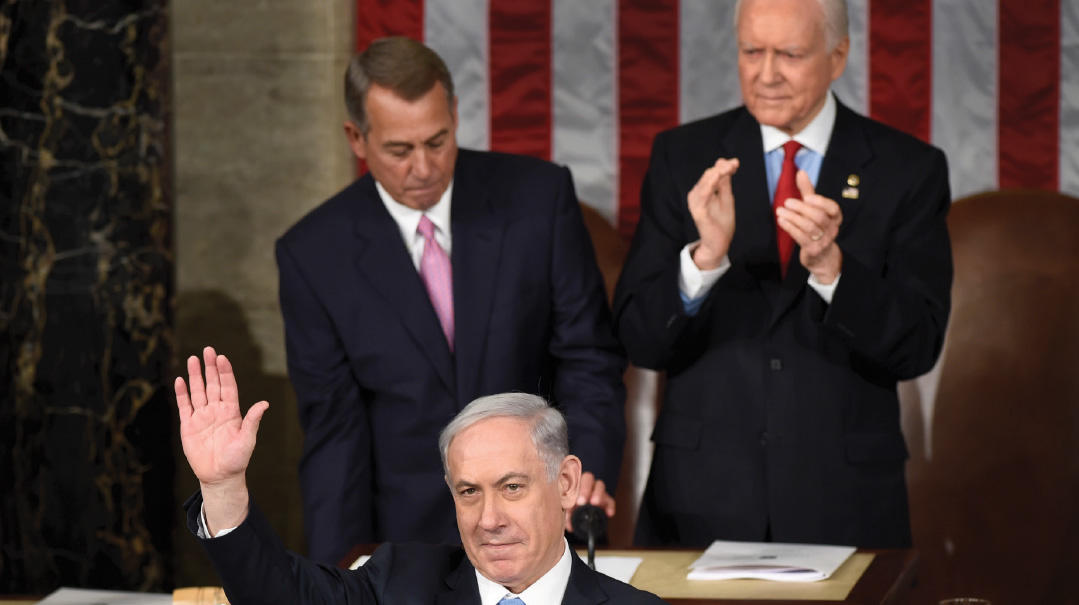War at the Front Door

The dedicated rebuilders of Jewish communities in Ukraine are facing the biggest challenge of their lives

Thirty years ago, when Ukraine — birthplace of so many branches of chassidus, hub of so many frum communities — officially declared its independence from the former Soviet Union, it looked as if the past had been wiped out forever. But in the last three decades, dedicated Jews have been building new infrastructure, finding their lost brothers, gathering the sparks of holiness lost amid decades of assimilation and Communist rule. Orphanages, schools, shuls, shiurim — you name it; the Jewish community had again carved out its place within Ukrainian society, offering support and meaning to so many thousands. And now, as Russian tanks roll through the streets, in a matter of days, many have simply picked up and run, leaving so much behind, while others have hunkered down, hoping the storm will pass. Many of us have seen the images — tens of thousands clogging the roads in front of the borders to other countries on Ukraine’s half-dozen frontiers, soldiers checking to make sure no male citizen between the ages of 18 and 60 leave the country. But whether they’ve stayed, left, or are still on the run, there’s overwhelming uncertainty and the real possibility that their life’s work will crumble.
When Rav Shlomo Baksht took on the challenge to relocate from Jerusalem to Odessa in 1993, there was little reason to be optimistic. The synagogue building had recently collapsed, and kosher food was little more than a fond memory from nearly a century before. There was no mikveh, no shochet, and little to suggest the community could be brought back to life. What Odessa did have, however, were 40,000 Jews — 80,000 if you counted the Odessa province, an area slightly smaller than Israel. So Rav Baksht took a leave of absence from his position as a rosh kollel for a year to see what could be done — and nearly three decades later, Odessa became a thriving Jewish city by any standard.
Last Shabbos, though, members of Rav Baksht’s kehillah, his partner Rav Refael Kruskal, and the 250 children in the three orphanages they head, were on the run.
Over Shabbos, a convoy of buses with hundreds of refugees from the Jewish community of Odessa travelled toward the Carpathian Mountains that border western Ukraine.
Rav Baksht, 62, chief rabbi of Odessa and head of the Orthodox kehillah, told Mishpacha that until last Thursday, he relied on assessments by the community’s private security company that even if Russian president Vladimir Putin did invade Ukraine, Odessa would be safe from attack, at least initially. He even told international media outlets that he was staying put. But within a few hours, all that changed.
“The explosions began on Thursday, and soon there were tanks in the streets, rolling by us,” he says. The private security company his kehillah works with made it clear that Odessa could no longer be considered safe. After consulting with several halachic authorities, they knew they’d have to leave the city.
“We left before noon on Friday for a journey that would take over 24 hours,” Rav Baksht relates. “Fleeing on Shabbos wasn’t even a question because of the danger. The goal was to get the children out of the path of the Russian invasion. Our original plan was to head for Lviv, a city close to the Polish border in western Ukraine, but by the time Russian soldiers crossed into Ukraine early Thursday morning, we realized that wouldn’t work — there were strikes to the east, the north and the south, and we had no intention of transferring the kids from one war zone to another. We looked for a place where we could weather the storm in relative safety.”
In the end, they didn’t actually leave Ukraine, but found a vacation spot, a camping ground, far from the shelling.
“Our security firm believes the war won’t come here,” says Rav Baksht. “But at the same time, Putin has defied predictions. We were assured Odessa wouldn’t be one of the first targets and it was. Nothing can be taken for granted.”
There are over 30,000 Jews in Odessa, and a few thousand of them are affiliated with the Orthodox kehillah.
“There’s a tradition that a rav doesn’t abandon his congregation, especially orphans, so we’re all in this together,” Rav Baksht says. “Some members of the community left for Moldova, others have stayed put. But the orphans — many of them abandoned and childen — are under our direct charge, and our first priority.”
While the Russian threats have been going on for a month already, some people are questioning why people didn’t leave before, and are instead scrambling at the last minute.
“No Ukrainians of military age, from 18 to 60, are allowed to leave the country now — it’s very complicated from a legal standpoint,” he says. But because they had busloads full of children, Ukranian soldiers let them through the various checkpoints.
As soon as they decided to flee, the orphanage kitchens jumped into action and prepared provisions for the road, although Rav Baksht confesses that, due to the overwhelming sense of responsibility and suspense, he didn’t eat anything but a bit of grape juice and a k'zayis of challah on both Shabbos night and morning.
“We kept rerouting,” he says. “We kept changing course to avoid danger zones and impossibly heavy — and dangerous — traffic.” Rav Baksht relied on the community’s security company to guide them. The company is Israeli, and he says they don’t make a move in these parts without them. They have reliable information from people on the ground, and provide updated data and assessments.
Rav Baksht is no longer a youngster, but he’d never consider abandoning ship. “This has been my community for upwards of 30 years,” he says. “They’re my responsibility. And so are the orphans — I’m no less responsible for their lives than I am for my own. We’re staying here to look after the orphans. We can’t just leave them to the mercy of strangers and make a run for it. And to transfer them from one unsafe location to another would also be harmful. We’re staying with them.”
Staying on Track
Rabbi Avraham Wolf, chairman of the Jewish Federation of Ukraine and a Chabad shaliach in Odessa, has meanwhile decided to stay put.
“We’ve purchased food supplies such as flour, rice, oil and water,” he says. “In addition, we’re trying to calm Jews who call us. We’ve been getting thousands of calls, and hundreds of Jews have come to the shuls for help. The Jewish community is going through a lot of tension, fear and anxiety. We’re trying to get people to stay on track.”
Rabbi Wolf is also responsible for a Chabad-sponsored orphanage with 120 children (which aren’t necessarily for actual orphans, but for the thousands of abandoned children in Ukraine who are coming from dysfunctional homes, alcoholic or addicted parents, and the like), a dormitory of 140 Jewish students from all over Ukraine, and a nursing home with 50 elderly residents, many of them Holocaust survivors.
“A captain stays on his ship,” he says.
Rabbi Wolf says that many more people were considering fleeing, but many in the community have no passports. “The Ukrainian interior ministry told everyone who applied for a passport that there are no appointments until August. We tried to wield whatever influence we could but it didn’t help. For two months there’s been no way to obtain a passport — everything’s closed. As for the border crossings, there are traffic jams 35 kilometers long in those directions. It’s impossible to get there.”
They’ve secured supplies of food, for expected refugees from other cities as well, and in the event that the war comes to our doorstep, they’re equipped with generators, fuel, and satellite phones.
“We arranged all this in advance,” he says, “so that if the Internet falls, we’ll still be able to stay in contact and help everyone. We’ll do what we can with whatever resources we have.”
WE’RE IN WAR MODE
Kyiv is home to over 100,000 Jews, the largest Jewish community in the country. At 6:30 on Shabbos morning, we all woke up to sirens and explosions. We’ve received hundreds of requests for aid, and everyone’s tense. You wake up with three little kids, you hear sirens, friends call you to tell you their houses are shaking from the explosions.
No one knows for sure what will happen. We hope for the best. A lot of shuls have hidden away their sifrei Torah out of fear of looting, and we’re not talking about the soldiers — when a country is plunged into chaos, civilians start taking matters into their own hands.
As for us, not only have we not cleared out, we’ve now set up another food depot, and we’ve increased the guard on the shul. The Chabad house is in war mode. So far no Jews have been hurt, but it’s not that there’s no danger. If a tank or a warplane comes through, there’s not much we can do. The fear is real. This morning we advised anyone who could to leave, but for now that’s impossible due to heavy traffic. In this situation it’s better to stay put, and not leave home at all.”
—Rav Ariel Markovitch, Chabad shaliach in Kyiv
NO OPTION TO FLEE
My husband had been an officer in the Israeli Air Force for 12 years when we decided to go on shlichus to Kyiv with our seven children. My husband is now the chief rabbi of Kyiv, and we’ve been here for 21 years. We had a flourishing community until last month, when the war clouds appeared on the horizon and most of the wealthiest citizens left the country. Those who remained are mostly the elderly, the sick, and the disadvantaged.
We’re currently distributing more and more hot meals and food baskets, and we’re also responsible for schools, preschools, and even a preschool for autistic children. Under these circumstances, it wasn’t an option to leave it all behind and run back to Israel.
When the bombing started, we gathered the Jews together in the community center. There are no bomb shelters in Kyiv, and we have no official instructions about what to do in case of emergency. So for now, we have enough mattresses and enough food in our warehouse to feed everyone, but we don’t know how long our supplies will hold out. At the same time, we’ve hired a private security company to protect us against looting, because police are effectively nonexistent.
There’s a group of Holocaust survivors living in the Jewish retirement home and we’re looking after them, trying to ease their fears as well as making sure they have a steady supply of necessities. They’re afraid for their lives, they don’t understand what’s happening. They hear the boom of missiles and they know that Russia is invading Ukraine. It takes them back 80 years. We tell them to stay positive, to daven with extra devotion, to help and support each other through this difficult time.
We’ve also asked all the essential workers in the Jewish community — dozens of cooks, drivers, and security guards — to show up for work. Nonessential workers we’ve instructed to stay at home, so school and preschool all takes place over Zoom.”
—Rebbetzin Inna Markovitch, wife of chief rabbi of Kyiv Rabbi Yonatan Markovitch
SAFER IN SHUL
We’re trying to answer the hundreds of pleas for aid. We know that the Jews here need of a lot of help and we’re doing our best. There are people here who have no family and are alone in the world. We make sure to talk to them — we have kids from the school call them to ask how they’re doing. A lot of the elderly can’t leave their homes, they’re disabled. We arrange deliveries of food and medicine for them.
There are currently battles taking places on the outskirts of Kharkiv, Russian forces are at the gates. What exactly is going on isn’t clear. But there are Russian tanks not far from here, we’re on standby to help with anything we can.
People come to our shul — the second-largest in Kharkiv — they come and they want to stay in the basement overnight. I can’t tell you how many people slept in the shul last night. On Shabbos morning I went to shul early. I expected to find it empty, that people would stay home. Instead I found 30 people waiting to daven Shacharis. I said to them, “What are you doing here? You need to be in shelter.”
They say, “No, we want to daven and be with everyone.” So we davened, we read the Torah, no one remained unmoved.
—Rabbi Moshe Moskowitz, Chabad shaliach to Kharkiv in eastern Ukraine
READY FOR THE REFUGEES
Ahead of Shabbos, we went over our food supplies, arranged sleeping places and other necessities. At this very moment we’re getting a huge kitchen ready to provide food for anyone who needs it, and we’re also looking for additional sleeping places. People who fled from the east are heading this way. At the moment there’s traffic. The drive from Kyiv to Lviv takes seven hours, and people are lined up in Kyiv waiting to escape. This evening we’re expecting a new wave of people.
—Rabbi Mendel Gottlieb, Chabad shaliach to Lviv in western Ukraine
(Originally featured in Mishpacha, Issue 901)
Oops! We could not locate your form.






